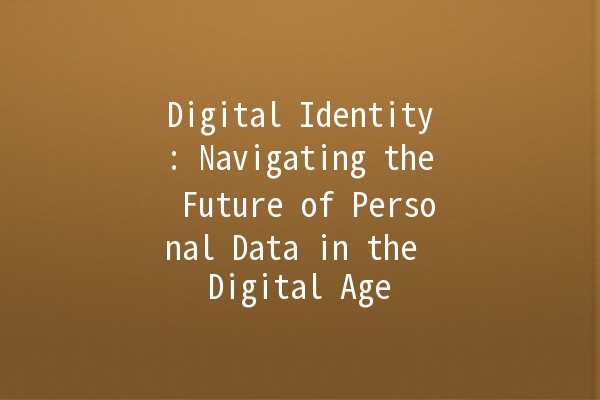




In today’s interconnected world, the concept of digital identity has evolved beyond simple usernames and passwords. As we conduct more of our lives online—whether for work, socializing, or shopping—understanding and managing our digital identities has become crucial. This article explores the significance of digital identity, practical tips to enhance productivity with it, and the implications of its management in our increasingly digital lives.
Digital identity refers to the information that exists online about an individual, which may include personal details, online behavior, social media profiles, and more. This digital persona shapes how we interact with services, brands, and other individuals online.

Here are five practical tips to enhance your productivity while managing your digital identity effectively:
Using unique, complex passwords for different accounts is fundamental in protecting your digital identity. A password manager can streamline this process.
Adopt a password management tool like LastPass or 1Password. These tools generate and store complex passwords, requiring you to remember only one master password. Regularly update your passwords, especially for sensitive accounts.
Regularly reviewing your online presence helps keep your digital identity accurate and secure. This includes updating profiles, removing outdated information, and ensuring your privacy settings are appropriate.
Set a quarterly reminder to audit your online presence. Google yourself to see what information is publicly available. Check your social media privacy settings and remove any posts or photos that no longer represent you or could be misinterpreted by potential employers.
Twofactor authentication adds an extra layer of security by requiring a second form of verification in addition to your password.
Enable 2FA on all your accounts that offer it. This often involves receiving a code via SMS or using an authentication app like Google Authenticator. Taking this extra step can significantly reduce the risk of unauthorized access.
Your digital identity can influence how others perceive you. Actively managing what information about you exists online can improve your reputation.
Engage positively on social media by sharing insightful content related to your industry. Networking platforms like LinkedIn allow you to connect professionally and showcase your skills. Join relevant groups and participate in discussions to familiarize yourself with your peers.
Understanding the nuances of data privacy is vital in the digital age. This knowledge enables better management of your digital identity.
Take courses on digital literacy or data privacy. Websites like Coursera and Udemy offer courses that can enhance your understanding of how to maintain your privacy and manage your digital identity effectively.
Digital identity encompasses all the information available online about an individual. It’s important because it affects access to services, personal branding, privacy, and reputation. A wellmanaged digital identity protects against identity theft, enhances professional opportunities, and fosters trust.
Protecting your digital identity involves using strong, unique passwords for different accounts, enabling twofactor authentication, and being cautious about the information you share online. Regular audits of your online presence can also help you identify vulnerabilities.
Employers often research candidates online. A positive digital identity, featuring professional achievements and networking activities, can enhance your career prospects. Conversely, negative information can hinder job opportunities.
If you discover false information, contact the website owner to request removal. You can also reach out to search engines to request removal from search results. Maintaining updated and accurate online profiles can help mitigate the effect of false information.
To manage your digital identity effectively, implement strong password practices, perform online audits, and regularly update your personal information. Leverage privacy settings on social media and engage positively to build a favorable online reputation.
Regular audits help you discover outdated or incorrect information, adjust privacy settings, and ensure your online persona accurately reflects who you are. This practice keeps you in control of your digital identity and enhances your personal and professional reputation.
By understanding digital identity and implementing these productivityenhancing techniques, you can navigate the complexities of maintaining a robust online presence. Whether you’re looking to secure your data or build a professional network, managing your digital identity effectively is essential in today’s digital landscape.